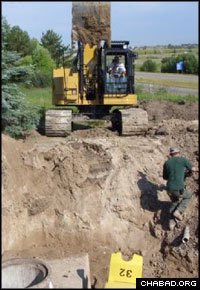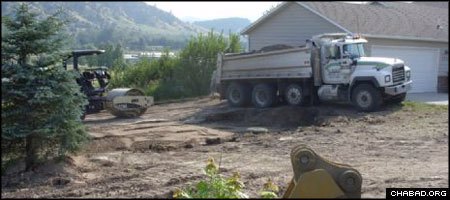Montana, a state known for its picturesque mountains, breathtaking national parks and winter skiing, will soon be home to an institution that could very well be the first in its history: a Jewish ritual bath.
Known as a mikvah, the structure being built by Chabad-Lubavitch of Montana is a fixture of most established Jewish communities. A necessary component of the laws governing Jewish family life, mikvahs are traditionally visited by married women on a monthly basis to acquire ritual purity. An increasing number of men have also taken up a custom, followed mainly by Chasidim, of immersing themselves in a mikvah prior to morning prayer services.
In Montana, a sprawling expanse of land populated by just 2,500 Jews, the ritual bath is expected to draw not only locals, but upwards of thousands of Jewish tourists.
For Stephanie and Larry Greenbaum, who moved to the state two years ago from Long Island, N.Y., the project is somewhat unbelievable. Never had the couple dreamed that their newfound home of Bozeman would soon have a mikvah.
“It was a very big deal that we were moving somewhere with no Jews,” said Stephanie Greenbaum.
But a year after their arrival, Rabbi Chaim and Chavie Bruk moved from New York to open Bozeman’s Chabad-Lubavitch center. Today, the Greenbaums avail themselves of the center’s Torah classes and Shabbat dinners, and send their seven-year-old daughter to the Hebrew school.
Appreciating the irony, Greenbaum, who was born and raised in Midtown Manhattan, noted: “We moved 2,400 miles to Montana to find our Jewish roots! It’s been amazing.”
As for the mikvah, she said that she had some familiarity with the practice of immersing, but wants a refresher course and a chance to learn all the intricacies from Chavie Bruk.
“We’re all thirsty for knowledge,” said Greenbaum. “We’re all very anxious to learn.”
A World of Possibilities

Essentially a pool of water connected to a reservoir of rainwater or snow melt, a mikvah must conform to dimensions laid out in the Code of Jewish Law. In the Montana case, it is being built in the Bruks’ back yard, with the majority of the pool’s structure sitting below ground level. Rabbi Gershon Grossbaum, a leading mikvah authority based in S. Paul, Minn., is supervising the construction.
To enhance users’ experiences, the mikvah will feature top-of-the-line accoutrements, such as a free-standing Jacuzzi bath and custom-made vanity. The tiles, fixtures and fittings are being designed by Chavie Bruk with the help of the Montana Tile and Stone Company.
For her part, Chavie Bruk said that many women in the community have expressed interest in going to a mikvah, but have so far been turned away from the practice by the sheer effort involved in finding one: The nearest ritual bath to Bozeman is in Salt Lake City, Utah, a six hour drive. For visitors of Glacier National Park, the nearest mikvah is in Calgary, Canada. Both of those are operated by their local Chabad-Lubavitch centers.
“Our plan was to do this as soon as physically possible,” said Bruk. “To be a Jewish community, you have to have a mikvah.”
To date, the Bruks have raised two thirds of the project’s anticipated cost, with $50,000 remaining.
Local resident Robin Bequet couldn’t be happier.
“When Chabad-Lubavitch of Montana started, it opened up all sorts of opportunities for us,” said Bequet, 48, who attends the Shabbat morning class with her husband and two teenage daughters. “and having a mikvah [raises things] to a whole new level. For it to be a regular part of our lives was not perceived as possible until now.”
“When Jews coming to Montana call us, one of the first questions they always ask is, ‘Do you have a mikvah?’ ” said Bruk. “And very soon, we’ll be able to say yes!”






Start a Discussion